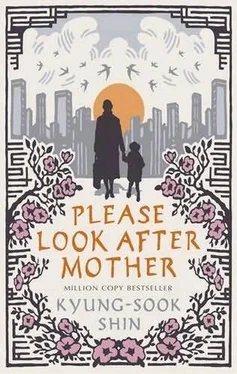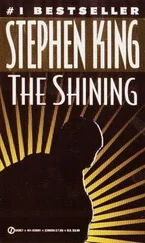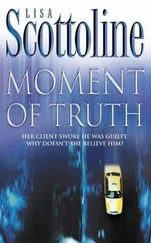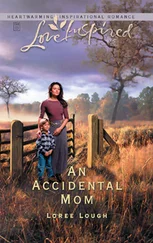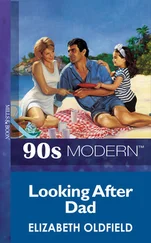Kyung-sook Shin - Please Look After Mom
Здесь есть возможность читать онлайн «Kyung-sook Shin - Please Look After Mom» весь текст электронной книги совершенно бесплатно (целиком полную версию без сокращений). В некоторых случаях можно слушать аудио, скачать через торрент в формате fb2 и присутствует краткое содержание. Жанр: Современная проза, на английском языке. Описание произведения, (предисловие) а так же отзывы посетителей доступны на портале библиотеки ЛибКат.
- Название:Please Look After Mom
- Автор:
- Жанр:
- Год:неизвестен
- ISBN:нет данных
- Рейтинг книги:4.5 / 5. Голосов: 2
-
Избранное:Добавить в избранное
- Отзывы:
-
Ваша оценка:
- 100
- 1
- 2
- 3
- 4
- 5
Please Look After Mom: краткое содержание, описание и аннотация
Предлагаем к чтению аннотацию, описание, краткое содержание или предисловие (зависит от того, что написал сам автор книги «Please Look After Mom»). Если вы не нашли необходимую информацию о книге — напишите в комментариях, мы постараемся отыскать её.
Told through the piercing voices and urgent perspectives of a daughter, son, husband, and mother, Please Look After Mom is at once an authentic picture of contemporary life in Korea and a universal story of family love.
You will never think of your mother the same way again after you read this book.
Please Look After Mom — читать онлайн бесплатно полную книгу (весь текст) целиком
Ниже представлен текст книги, разбитый по страницам. Система сохранения места последней прочитанной страницы, позволяет с удобством читать онлайн бесплатно книгу «Please Look After Mom», без необходимости каждый раз заново искать на чём Вы остановились. Поставьте закладку, и сможете в любой момент перейти на страницу, на которой закончили чтение.
Интервал:
Закладка:
You stood up and hurried back to the road without bothering to brush the sand off your clothes. You decided against taking the plane to Seoul, and instead took a taxi to Taejon and got on a train to Chongup. Thinking all the while that you hadn’t seen Mom’s face in almost two seasons.

You remember a classroom from long ago.
It was a day that the sixty or so kids filled out applications for middle school. If you didn’t write an application that day, you were not going to middle school. You were one of the kids not working on an application. You didn’t completely understand what it meant that you would not be going on to middle school. Instead, you were feeling guilty.
The night before, Mom had yelled at Father, who was sick in bed. She had shouted at him, “We don’t have anything, so how is that girl going to survive in this world if we don’t send her to school?” Father got up and left the house, and Mom lifted a squat table from the floor and threw it into the yard in frustration. “What’s the point of having a household when you can’t even send your kids to school? I might as well break it all!” You wished she would calm down; you didn’t mind not going to school. Mom wasn’t appeased by throwing the table. She opened and banged shut the door of the cellar and yanked all the laundry off the line, crumpled it, and threw it on the ground. Then she came to you, cowering by the well, and took the towel off her head and brought it to your nose. She ordered, “Blow your nose.” You could smell the intense stink of sweat on Mom’s towel. You didn’t want to blow your nose, especially not into that smelly towel. But Mom kept telling you to blow your nose as hard as you could. When you hesitated, she said that way you wouldn’t cry. You were probably standing there looking at Mom with an expression bordering on tears. Telling you to blow your nose was her way of saying, Don’t cry. Unable to resist her, you blew your nose, and your snot and the smell of sweat mingled in the towel.
Mom came to school the next day wearing that same towel. After she spoke with your teacher, your teacher came to you and handed you an application form. You raised your head and looked outside the classroom as you wrote your name on the form, and you saw Mom watching you from the hall. When your eyes met, she took the towel off her head and waved it, smiling brightly.
Around the time the fee for middle school was due, the gold ring that used to be on Mom’s left middle finger, her sole piece of jewelry, disappeared from her hand. Only the groove on her finger, etched by many years of wearing the band, was left behind.

Headaches attacked Mom’s body constantly.
During that visit to your childhood home, you woke up thirsty in the middle of the night and saw your books looming over you in the dark. You hadn’t known what to do with all of your books when you prepared to go to Japan for a year with Yu-bin on his sabbatical. You sent most of the books, books that had stayed with you for years, to your parents’ house. As soon as Mom received your books, she emptied out a room and displayed them there. After that, you never found the opportunity to take them back with you. When you visited your parents’ house, you used that room to change your clothes or to store your bags, and if you stayed over, that was where Mom would place your blankets and sleeping mat.
After you got a drink of water and returned to your room, you wondered how Mom was sleeping, and you carefully pushed her door open. It looked as if she wasn’t there. “Mom!” you called. No answer. You fumbled with the switch on the wall and turned on the light. Mom wasn’t there. You turned on the light in the living room and opened the bathroom door, but she wasn’t there, either. “Mom! Mom!” you called as you pushed the front door open and stepped into the yard. The early-morning wind burrowed into your clothes. You turned on the light in the yard and glanced quickly at the wooden platform in the shed. Mom was lying there. You ran down the steps to the yard and approached her. She was frowning, as she had done earlier, asleep, hand on her head. She was barefoot, and her toes were curled under, perhaps from the cold. The simple dinner and the talk you had shared while you strolled around the house together shattered. It was an early morning in November. You brought out a blanket and covered Mom with it. You brought socks and put them on her feet. And you sat next to her until she woke up.

Thinking of ways to earn money other than from farming, Mom brought a wooden malt-mold into the shed. She would take the whole wheat she harvested from the fields and crush it and mix it with water and put it in the mold and make malt. When the malt fermented, the entire house smelled of it. Nobody liked that smell, but Mom said it was the smell of money. There was a house in the village where they made tofu, and when she brought them the fermented malt, they sold it to the brewery and gave the money to Mom. Mom put that money in a white bowl, stacked six or seven bowls on top of it, and placed it on top of the cabinets. The bowl was Mom’s bank. She put all her money up there. When you brought home the invoice for tuition, she took money from the bowl, counted it out, and put it in your hand.

Later in the morning, when you again opened your eyes, you discovered that you were lying on the platform in the shed. Where was Mom? She wasn’t there, but you could hear chopping from the kitchen. You got up and went in. Mom was about to slice a large, white radish on the chopping block. The way she held the knife looked precarious. It wasn’t the way she used to julienne radish to make slaw, expertly, without looking down. Mom’s hand holding the knife was unstable, and the knife kept slipping off the radish onto the chopping block. It seemed she would cut her thumb off. “Mom! Wait!” You grabbed the knife from her hand. “I’ll do it, Mom.” You moved to the chopping block. Mom paused but then stepped aside. The steel basket in the sink held the languid, dead octopus. There was a stainless-steel steamer on the gas range. She was going to put a layer of radish on the bottom of the steamer and steam the octopus. You were about to ask, Aren’t you supposed to parboil the octopus, not steam it? But you didn’t. Mom arranged slices of radish on the bottom of the steamer and adjusted a stainless-steel shelf inside. She put the whole octopus in and placed the lid on top. This was the way she usually cooked seafood.
Mom wasn’t used to fish. She didn’t even call fish by their proper names. To Mom, mackerel and pike and scabbard fish were all just fish. But she differentiated between types of beans: kidney beans, soybeans, white beans, black beans. When Mom had fish in her kitchen, she never made sashimi or broiled or braised it, but always salted and steamed it. Even for mackerel or scabbard fish, she made a soy-based sauce with red-pepper flakes, garlic, and pepper and steamed it on a plate over rice that was cooking. Mom never put sashimi in her mouth. When she saw people eating raw fish, she looked at them with a distasteful expression that said, What are they doing? Mom, who had steamed skate from the time she was seventeen years old, wanted to steam octopus, too. Soon the kitchen was filled with the smell of radish and octopus. As you watched Mom steaming octopus in the kitchen, you thought of skate.
People from Mom’s region always put skate on their ancestral-rite table. Mom’s year was structured around the ancestral rites she held, once in spring and twice each in summer and winter. Mom had to sit next to a well and clean seven skates each year, if one counted New Year’s and Full Moon Harvest. Usually the skate Mom bought was as big as a cauldron lid. When your mom went to the market and bought a red skate and dropped it next to the well, this meant that an ancestral rite was approaching. It was hard work to clean skate for the winter ancestral rites, in weather that instantly turned water into ice. Your hands were small, and Mom’s were thickened from labor. When Mom made a slit with the knife in the skin of the skate with her red, frozen hands, your young fingers pulled the membranes off. It would have been easier if they came off in one piece, but they would fall off in sections. Mom would make another slit in the fish, and the whole process would be repeated. It was a typical winter scene, you and your mom squatting by the well that was covered in thin ice, skinning the skate. The cleaning of the skate repeated itself each year, as if someone were rewinding film. One winter, Mom gazed at your frozen hands as you sat across from her and declared, “Who cares if we don’t skin it,” stopped what she was doing, and confidently cut the fish into chunks. It was the first time that the ancestral-rite table had seen a skate with its skin on. Father asked, “What’s wrong with this skate?” Mom replied, “It’s the same skate, just not skinned.” Father’s sister grumbled, “You have to put care into food for the ancestral rites.” “Then you try peeling it,” Mom retorted. That year, whenever something bad happened, someone brought up the unpeeled skate. When the persimmon tree didn’t bear fruit; when one of your brothers, who was playing a stick-toss game, got poked in the eye by a flying stick; when Father was hospitalized; when cousins fought-Father’s sister grumbled that it was because Mom hadn’t bothered to skin the skate for the ancestral rites.
Читать дальшеИнтервал:
Закладка:
Похожие книги на «Please Look After Mom»
Представляем Вашему вниманию похожие книги на «Please Look After Mom» списком для выбора. Мы отобрали схожую по названию и смыслу литературу в надежде предоставить читателям больше вариантов отыскать новые, интересные, ещё непрочитанные произведения.
Обсуждение, отзывы о книге «Please Look After Mom» и просто собственные мнения читателей. Оставьте ваши комментарии, напишите, что Вы думаете о произведении, его смысле или главных героях. Укажите что конкретно понравилось, а что нет, и почему Вы так считаете.
